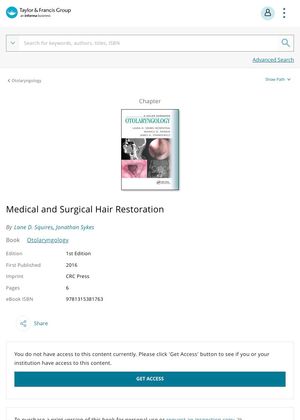Medical and Surgical Hair Restoration
August 2016
in “
CRC Press eBooks
”
alopecia endocrine disorders hypopituitarism hypothyroidism hypoparathyroidism diabetes mellitus hyperprolactinemia polycystic ovary syndrome Cushing syndrome dyslipidemia cardiovascular disease fungal infections medication-induced hair loss chemotherapeutics oral contraceptives anabolic steroids poor nutrition trauma PCOS diabetes birth control pills steroids

TLDR Before treating hair loss, it's crucial to diagnose and treat any underlying medical conditions that may be causing it.
The document from 7 years ago discussed various medical conditions that could lead to alopecia, including endocrine disorders like hypopituitarism, hypothyroidism, hypoparathyroidism, diabetes mellitus, hyperprolactinemia, polycystic ovary syndrome, and Cushing syndrome. It also mentioned associations with dyslipidemia and cardiovascular disease. Other potential causes of hair loss such as fungal infections, medication-induced hair loss (from chemotherapeutics, oral contraceptives, anabolic steroids), poor nutrition, or prior trauma were also considered. The document emphasized the importance for clinicians to diagnose and treat these medical conditions before initiating definitive treatment for hair loss.




